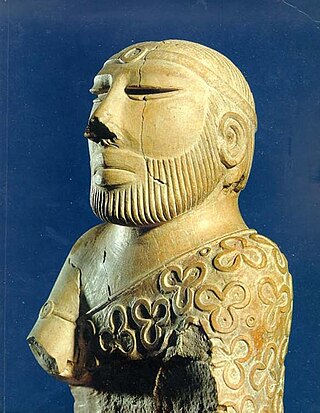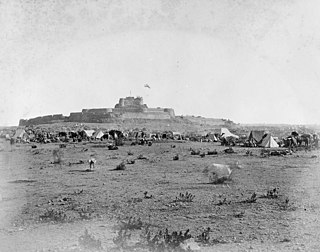
The history of Pakistan preceding the country's creation in 1947. Although, Pakistan was created in 1947 as a whole new country by the British through partition of India, but the history of the land extends much further back and is intertwined with that of Afghanistan, India, and Iran. Spanning the northwestern expanse of the Indian subcontinent and the eastern borderlands of the Iranian plateau, the region of present-day Pakistan served both as the fertile ground of a major civilization and as the gateway of South Asia to Central Asia and the Near East.

Panipat is a historic city, located in Haryana, India. It is 95 km north of Delhi and 169 km south of Chandigarh on NH-1. The three major battles fought in 1526, 1556 and 1761 took place near the city. The city is famous in India as the "City of Weavers" and "Textile City". It is also known as the "cast-off capital" due to being "the global centre for recycling textiles". Panipat is also home to a variety of manufacturing industries including wool and cotton milling, saltpetre refining, and the manufacture of glass, electrical appliances, and other products. Panipat is included in the list of Critically Polluted Industrial Areas in India. The Comprehensive Environment Pollution Index (CEPI) of the city is 71.91 as against 88.50 of Ankaleshwar (Gujarat). The fatal field of Panipat is the site of three battles that changed the course of India's history, resulting in the creation and confirmation of the Mughal Empire. The third battle led to the decisive defeat of the Maratha Confederacy in North India, which became a dominating power in Delhi by then and paved the way for the British colonial rule of India.

Attock, formerly known as Campbellpur, is a city in Punjab, Pakistan, not far from the country's capital Islamabad. It is the headquarters of the Attock District and is 36th largest city in the Punjab and 61st largest city in the country, by population. The city was founded in 1908 several miles southeast of the historical city of Attock Khurd, which had been established by the Mughal Emperor Akbar in the 16th century, and was initially named in honour of Sir Colin Campbell.
Hindus have experienced both historical and ongoing religious persecution and systematic violence, in the form of forced conversions, documented massacres, genocides, demolition and desecration of temples, as well as the destruction of educational centres.

The Muslim conquests in the Indian subcontinent mainly took place between the 13th and the 18th centuries. Earlier Muslim conquests in the subcontinent include the invasions which started in the northwestern subcontinent, especially the Umayyad campaigns during the 8th century. Mahmud of Ghazni, Sultan of the Ghaznavid Empire, preserved an ideological link to the suzerainty of the Abbasid Caliphate and invaded vast parts of Punjab and Gujarat during the 11th century. After the capture of Lahore and the end of the Ghaznavids, the Ghurid ruler Muhammad of Ghor laid the foundation of Muslim rule in India in 1192. In 1202, Bakhtiyar Khalji led the Muslim conquest of Bengal, marking the easternmost expansion of Islam at the time.
Diya Aur Toofan is a 1969 Pakistani, Urdu romantic comedy film which is Produced & Directed by Rangeela.

Umerkot is a city in the Sindh province of Pakistan. The Mughal emperor Akbar was born in Umerkot in 1542. The folk deities Pabuji and Ramdev married in Amarkot.

Larki Punjaban (Urdu: لڑکی پنجابن, is a 2003 Pakistani Urdu film directed by Syed Noor and starring Babar Ali, Saima, and Shamyl Khan.
Anti-Indian sentiment, a form of racism also known as Indophobia or anti-Indianism, includes negative feelings such as hatred and disgust towards India, Indians, and Indian culture. Indophobia, in the context of anti-Indian prejudice, is "a tendency to react negatively towards people of Indian extraction, against aspects of Indian culture and normative habits". Its opposite is Indomania.

The Hindu Gymkhana is a colonial-era building located on Sarwar Shaheed Road in Karachi, Pakistan. It was the first public building in Karachi to adopt the Mughal-Revival architectural style. It was established in 1925 by the Karachi's Hindus as an exclusive club for their community. The building houses the National Academy of Performing Arts.

The Jamrud Fort is located beside Bab-e-Khyber at the entrance to the Khyber Pass from the Peshawar side in the district of Khyber in KPK, Pakistan. After the death of Sardar General Hari Singh Nalwa, Khalsa Sarkar Wazir Jawahar Singh nominated General Gurmukh Singh Lamba as chief administrative and military commander to restore and consolidate the Khalsa army gains.

Abu'l-Fath Jalal-ud-din Muhammad Akbar, popularly known as Akbar the Great, and also as Akbar I, was the third Mughal emperor, who reigned from 1556 to 1605. Akbar succeeded his father, Humayun, under a regent, Bairam Khan, who helped the young emperor expand and consolidate Mughal domains in the Indian subcontinent. He was considered one of the greatest emperors of India in Indian history.

Noorpur Ki Rani is a Pakistani television series which was broadcast on Hum TV from 25 April 2009 to on 3 October 2009. Written by Pakistani author and screenwriter Samira Fazal, and directed by Haissam Hussain, Noorpur Ki Rani was based on the English novel Rebecca by Daphne Du Maurier. The series stars Sanam Baloch, Nauman Ijaz and Mahnoor Baloch. The plot revolves around an orphan girl and her journey to become the princess of Noorpur for which she dreamed so long.
Kal Chaudhvin Ki Raat Thi is a popular ghazal from the movie Khamoshi. It was originally sung by Jagjit Singh but the version by Ghulam Ali, Asad Amanat Ali and Abida Parveen is also popular. It is written by Ibn-e-Insha. This song was also sung by Kumar Sanu in the movie Jiyala, which was also a semihit in the 1990s. The song was also sung by Nighat Akbar on PTV in 1970's before the separation of East Pakistan and becoming Bangladesh.
Akbar Agha is a Pakistani author, educator and former diplomat.
During the 1971 Bangladesh Liberation War, members of the Pakistani military and Razakar paramilitary force raped between 200,000 and 400,000 Bengali women and girls in a systematic campaign of genocidal rape. Most of the rape victims of the Pakistani Army and its allies were Hindu women. Some of these women died in captivity or committed suicide, while others moved from Bangladesh to India. Imams and Muslim religious leaders declared the women "war booty". The activists and leaders of Islamic parties are also accused to be involved in the rapes and abduction of women.
Religious discrimination in Pakistan is a serious issue for the human rights situation in modern-day Pakistan. Hindus, Christians, Sikhs, Shias, and Ahmadis among other religious minorities often face discrimination and at times are even subjected to violence. In some cases Christian churches and the worshippers themselves have been attacked. Although, there is very little record of this. Khawaja Nazimuddin, the 2nd Prime Minister of Pakistan, stated: "I do not agree that religion is a private affair of the individual nor do I agree that in an Islamic state every citizen has identical rights, no matter what his caste, creed or faith be".
The Pakistan Ulema Council (PUC) is a Muslim umbrella group and organization in Pakistan whose members include Islamic clerics and legal scholars from a range of Islamic traditions. Maulana Tahir Mehmood Ashrafi is its current chief. The organization was established initially to support a Christian girl who was charged with blasphemy.

Ghughi is a 2018 Pakistani drama serial based on Amrita Pritam's 1950 novel Pinjar. This drama is directed by Iqbal Hussain, written by Amna Mufti and produced by Cereal Entertainment. It originally aired on TV One Pakistan. It stars Adnan Siddiqui as Rasheed and Amar Khan as Nirmala in lead roles.
The Pakistan Armed Forces have been criticized for eroding democratic processes in Pakistan, for being the largest business conglomeration in the country and for excessive control over the domestic and foreign policies of Pakistan. Critics of the Pakistan Army, such as human rights activist Manzoor Pashteen, have been jailed while like-minded Pakistani citizens are warned against criticizing the military establishment. In Pakistan, the military is considered a part of what is known as The Establishment; they control the state through a backdoor and are a part of a working deep state.











